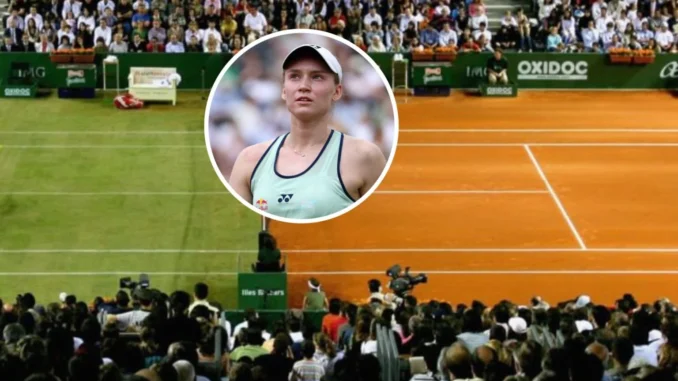
Elena Rybakina, the world No. 11 and 2022 Wimbledon champion, has returned to the grass courts of the Berlin Open, a WTA 500 event, with her sights set on recapturing the magic of her Grand Slam triumph. As she navigates the transition from the red clay of Roland Garros to the slick green surfaces of Berlin, the 26-year-old Kazakhstani star opened up about the significant adjustments required to adapt her game, admitting, “It’s not easy to change from any surface, especially grass, which is very different after clay.” Her candid reflections, shared during an interview with Youku Sports, highlight the physical and mental demands of this shift as she prepares for Wimbledon, where she hopes to reclaim her 2022 glory.
Rybakina’s game, defined by a thunderous serve—arguably the best in women’s tennis—and aggressive baseline play, thrives on faster surfaces like grass and hard courts. Her 2022 Wimbledon run, where she stormed past Ons Jabeur in the final to become Kazakhstan’s first Grand Slam singles champion, showcased her dominance on grass. Yet, the transition from clay, where she claimed titles in Bucharest (2019), Rome (2023), and Strasbourg (2025), poses unique challenges. “The ball bounce is really low, and you need to come to take the ball. It’s not coming to you,” she explained, emphasizing the need to attack early on grass, unlike clay’s slower, higher-bouncing rallies that reward patience and topspin. This shift demands a recalibration of her shot selection, as clay’s forgiving surface allows for defensive play, while grass punishes hesitation with its lightning-fast pace.
Movement is another hurdle. On clay, Rybakina can slide into shots, leveraging her 6-foot frame to cover the court. Grass, however, requires precise, controlled footwork to avoid slipping, a stark contrast she described: “You cannot slide. You need to adjust.” This adjustment is particularly taxing after a grueling clay season, where she reached the French Open quarter-finals in 2025, falling to Jasmine Paolini in a 6-4, 1-6, 7-5 thriller. “It takes time,” she noted, acknowledging the physical toll of adapting to grass’s low bounce and quick rallies, which demand explosive sprints and sharp reflexes rather than clay’s endurance-based sliding.
Rybakina’s Berlin campaign, where she advanced to the quarter-finals before retiring against Victoria Azarenka due to illness, underscores the mental and physical strain of the transition. “Hopefully by Wimbledon, I will get my best form,” she said, banking on preparatory tournaments like Berlin and Eastbourne to fine-tune her grass-court instincts. Her serve, which delivered 43% unreturned first serves in 2024, remains her biggest weapon, but she’s working to enhance her net play and volleying, tactics that grass rewards. “I should come to the net more often, finish points,” she said at Roland Garros, a strategy she’s honing to exploit grass’s shorter rallies, where points often end in under five shots, compared to clay’s grueling 10-plus-shot exchanges.
Despite her clay successes, including a 2023 Italian Open title earned after Anhelina Kalinina’s retirement, Rybakina’s heart lies with faster surfaces. “I prefer faster surfaces because my game is aggressive,” she admitted, noting that her serve’s effectiveness diminishes slightly on clay but can be “a certain advantage” with proper preparation. Her 2025 season, with titles in Abu Dhabi, Stuttgart, and Strasbourg, reflects her versatility, but grass holds special significance. “I feel confident on the grass, which I actually never thought I’d be that good on,” she told Eurosport in 2023, recalling her junior struggles on the surface.
The Berlin Open, with its competitive field including Aryna Sabalenka and Coco Gauff, has been a crucible for Rybakina’s grass-court adjustments. Social media posts from fans noted her improved health, with one user writing, “Rybakina’s allergies are better, and she’s sleeping well compared to 2024,” a boost after health issues plagued her 2024 French Open withdrawal. Her decision to play doubles in Berlin, partnering with Veronika Kudermetova, was strategic, aimed at gaining more court time to prepare for the Billie Jean King Cup and Wimbledon. “I played doubles for more time on court,” she confirmed, showcasing her commitment to sharpening her grass-court game.
As Rybakina eyes Wimbledon, where she reached the semi-finals in 2024 before falling to Barbora Krejcikova, her Berlin experience—despite the retirement—has been a vital step. The grass season’s brevity, starting just a week after Roland Garros, amplifies the challenge, but Rybakina’s adaptability and firepower make her a perennial threat. “It’s a process,” she said, echoing Sabalenka’s view that surface transitions are about incremental improvements. With her serve firing and her mindset focused, Rybakina’s quest to lift the Venus Rosewater Dish again is a saga of skill, strategy, and sheer determination.
Leave a Reply